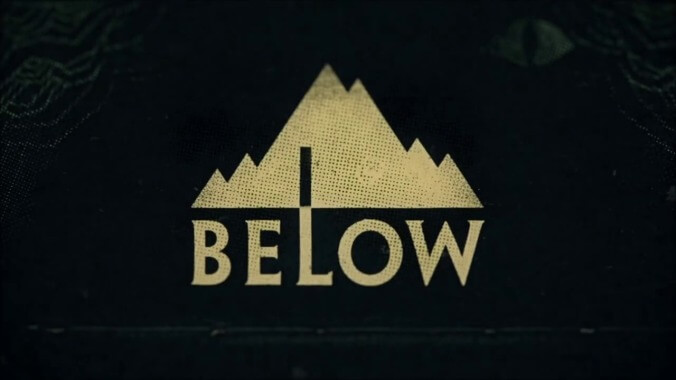Below wants you to know exactly how tiny and insignificant you really are

Every Friday, A.V. Club staffers kick off our weekly open thread for the discussion of gaming plans and recent gaming glories, but of course, the real action is down in the comments, where we invite you to answer our eternal question: What Are You Playing This Weekend?
Below’s opening moments aren’t fucking around: Zooming in at an agonizingly slow pace, from what seems, at first, to be a blank expanse of stars, the camera gradually reveals itself to be gliding over a vast and stormy ocean. Slowly—so slowly!—you begin to make out a tiny object plowing across the roiling waves: a ship, piloted by a single occupant. Just as you feel the last ebbs of your patience giving out—none of this 4-5 minute sequence is interactive—the water around the boat starts to lighten, and your vessel comes suddenly aground on an abandoned island. The occupant hops out, the camera zooms in to introduce you to your player character… and then stops, still far farther away than video game convention or comfort might suggest. The message is clear: The universe is vast, you are tiny, and no one is coming to help.
Not even some disembodied tutorial text; Below—the latest from indie studio Capybara Games, and a spiritual successor to their name-making, similarly slow-paced Superbrothers: Sword & Sworcery EP—is remarkably slight about telling you what to do, or even what you can do. Crafting systems leer ominously out of menus with the barest of explanation, hunger and thirst meters tick inevitably down, and it comes as a legitimate shock when—after a brief perusal of the controls screen, the closest thing the game has to a traditional tutorial—you find out you have a run button, making traversing the game’s dark, beautiful island a little bit easier to bear.
Where S&S had, probably, too much dialogue—and I’ll confess to being in the minority that couldn’t hook into that indie darling’s charms more or less at all—Below has none. It’s a mystery game delivered in the trappings of a top-down Zelda pastiche, complete with a heaping helping of roguelike and survival game elements. Themes bleed through in the mechanics, instead: Light is life, and darkness is death, as you traverse endless caverns full of traps that will absolutely kill you if you don’t have a torch or lantern to guide your way. And when they do, that’s it; soon, another boat will be sailing to the island, with another lonely occupant, who’ll harvest your corpse for loot and then try to make it a little further than the last.
None of this is fun, in any sort of traditional sense. The combat (at least in the early going) is rote, the limited inventory is cumbersome, and it’s often hard to feel like you’re making “progress,” that lifeline of maintaining positive player emotion, as you tramp through yet another identical, beautiful, dimly lit cavern. And yet the game’s sense of mystery—enforced by the returning musical flavoring of Jim Guthrie—makes it feel like something deeper than fun is going on. Personally, I can’t handle it in more than a few short bursts at a time, but it keeps sticking in the back of my brain, luring me back, a dark, mysterious island of a game just begging to be explored.